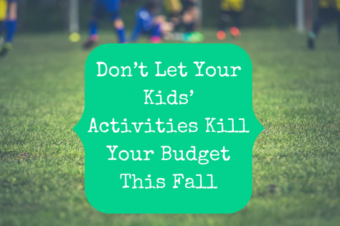
There are 3 foundational things that you can start developing in your children from an early age that will help make college less of a burden on your budget.
As parents, almost all of us want our kids to go to college. However, only about half of us can find room in our budgets to save towards college. Everyone seems to be stressing out, asking, “How am I going to pay for college?” that we forget that that’s only half of the equation.
It’s not just how to pay, but what to pay as well. Instead of just trying to figure out how to cover the bill, we should seek out ways to reduce the bill itself, so we will have less to worry about paying. Below are three ways you can prepare your kids (or yourself) for an affordable college experience.
Start With Why
When it comes to college, you have to start out by looking at the big picture. As Simon Sinek says, you need to start with why. Why is your son or daughter even going to college in the first place? Is it career preparation? A coming-of-age experience? To broaden their horizons and expand their minds? To find a spouse? Everyone may have a slightly different answer, and your “why” will have profound effects on the college you choose and how much you spend on it.
Once you figure out your goal, you can assess the best and most affordable means to achieving that goal. Community colleges can be a great way to earn credits cheaply if you don’t mind missing out on “dorm life.” Local state universities provide just as good of preparation for many careers as do US News’ highest ranked schools.
A lot of the benefits of college, such as gaining independence, meeting different kinds of people and even certain careers, don’t even require college. Things like moving out of a parents’ house, going on a missions trip or learning a trade may be more appropriate ways of reaching your goal than a college education. Don’t waste your money on a degree you don’t even need!
Match Your Whys
One key, though, is to make sure you and your kids are on the same page. The younger you start instilling in them the purposes of going to college, the easier it will be. If you don’t, you could find yourself with an 18-year-old ready to borrow $100,000+ in order to go to a private school with an undeclared major, just because that’s where her best friend (or boyfriend) is going.
Start With Work
Setting the right expectations is paramount, but it’s not the only tool in your arsenal. You also have something as old as the Garden of Eden at your fingertips: Work.
Don’t let your kids try to tell you that working and studying are mutually exclusive. In Georgetown University’s study Learning While Earning, they found that about 40% of undergraduate and 76% of graduate students work at least 30 hours a week. Of those who work, 25% do so full-time while also studying full-time. Back when I was studying at CSU San Marcos I worked 30-40 hours a week and even took 18 credits one semester. Granted, I didn’t have a very exciting social life, but I never had any debt either.
Work Has Many Benefits
Work benefits students far beyond just helping pay the bills. A strong work ethic will help your student do better in school (and not have to pay to repeat courses!). The Georgetown study also found that working students are upwardly mobile and more likely to move into managerial positions after graduating. Some jobs even provide educational benefits or scholarship opportunities. As a teenager, I earned a scholarship through my union while working at a grocery store.
Work Is A Life Skill
Work ethic is best taught at a young age, and you will do your children a favor if you make them work. You don’t want them to enter the workforce having never worked a day in their lives.
I saw a great example of this firsthand when I had a co-worker in his very first job- as a lawyer. He came from a well-off family and was never required to work. Instead, he was involved in sports and made it through high school, college, and law school before ever having a real job at the ripe old age of 26.
It was terrible. He didn’t know how to work at all. He was a nice guy, but he was a burden on his co-workers and it affected his relationships with them and his career. His parents cheated him out of the opportunity to learn to work when he was young and the poor guy will live with the consequences for the rest of his life. Please, don’t do the same to your kids.
Start Early
Work isn’t the only thing that’s good to start early. Kids these days can even start earning college credits early. Yes, you can earn college credits while still in high school and it is usually a lot cheaper.
Advanced Placement Exams
When I was in high school I took three Advanced Placement (AP) classes and passed the exams, which gave me a full semester’s worth of college credit. Based on the average costs for the 2021-2022 school year, those three high school classes would be worth $5,370 at an in-state public school and $19,035 at a private school. You can check with your local high school to see what AP courses they offer.
Dual Enrollment
Some states and many individual colleges also allow eligible students to take college courses for free while they are still in high school. In the state of Washington, where I live, the program is called Running Start. I know of people who have completed the first two years of college while still in high school, with the state paying for it. That is worth $21,480 at an in-state public school and $76,140 at a private school. Imagine getting half of a degree for free, much less being two years ahead!
For individual schools offering dual enrollment, check out the lists on this website. Another great option is the Arizona State University Universal Learner program where anyone (regardless of age) can try out college courses for $25 each. If it goes well and you like your grade, you can then pay $400 for the college credit. If your child wasn’t ready and it didn’t work out, you’re only out $25 and there is nothing on their permanent record.
Credit-By-Exam
But what if your local high school doesn’t offer AP classes and dual enrollment isn’t a good fit? If you and your child are willing to take it upon yourselves, you can still earn college credit while in high school through credit-by-exam (CBE). With CBEs, the student studies independently then takes an exam for college credit. The main exam providers are the College Board’s College Level Examination Program (CLEP) and DSST, and the exams usually cost around $100. They aren’t free, but they are a lot cheaper than traditional college courses and there is no minimum age requirement. With a some extra effort, you can augment what your child is already learning in class and they can earn college credit for it.
With a little bit of thought, time, and effort, you can prepare your kids for a future without debilitating student loan debt. If you take the time to discover why you want your kids to go to college, teach them to work hard, and have them begin earning college credits early, they will have both a more purposeful and more affordable experience. You may not have room in your budget to save for college, but there is a lot you can do on the front end to limit the cost of college for your family!




6 Responses
Lee
April 14, 2022Hello I am a treasurer at our church. Recently hired an associate pastor. As a church we gave him $20,000 towards a down payment for a house. Would that be considered housing allowance or taxable wages?
Amy
April 24, 2022Lee, unless the funds were designated as a housing allowance prior to being paid, it is taxable wages. The housing allowance must be designated proactively and cannot be designated after the funds have been paid.
Jeff
May 10, 2022Love Sinek’s book and love how it relates to this article, great read! Malcolm Gladwell also has quite a bit to say on College in his “Revisionist History” podcast that supports what you’re talking about when determining where to go. Thanks for the thoughtful article!
Amy
May 13, 2022Thank you, Jeff! I’m a big Malcolm Gladwell fan but haven’t heard that podcast.
Rich
April 4, 2023I’m amazed at how little my kids’ friends work while they’re in college. One of our sons pursued an IT degree, and he was able to get a paid co-op position in the IT department of a major employer in our area. This co-op was guaranteed full-time paid work for him during the summers while he was in school. But toward the end of his first summer working there, they asked if he wanted to work part-time during the school year too. He had classes only 3 days and one night a week, so he was able to work 2 days a week for this company. Totally paid his way through college while still living with us at home. We’re very thankful that he was able to graduate without debt.